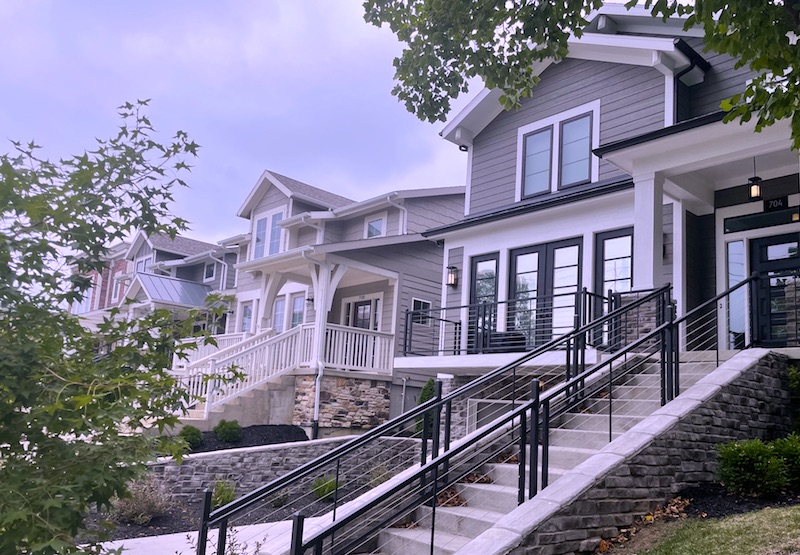Yup, this is about new building energy codes. Don’t look away: it will be relevant to you – both home and business owners. Right now this conversation is very relevant because Kansas City, MO is in the middle of debating updates to city building energy codes.
Why does this matter? If we adopt updated energy codes, we can make all new buildings more energy efficient, saving money, increasing climate resiliency and improving indoor air quality. Then Metropolitan Energy Center and our partners can stop debating energy codes and start making energy retrofits that will make a real dent in our large greenhouse gas (GHG) building emissions.
Our region’s building GHG emissions are more than 20 percent higher than the national average of 40 percent. If our cities don’t update energy codes, then we will be stuck in the cycle of having to retrofit poorly insulated structures for years to come. Retrofits like adding insulation and updating heating and cooling equipment (HVAC) are much more expensive than using best practices in new construction. Plus, being stuck in buildings with low-efficiency standards only perpetuates health, resiliency and affordability problems.
Here are five reasons we should all care about updating our energy codes:
- Updating codes will make homes more energy efficient & comfortable
Do you have rooms with big comfort issues? Does a room over a garage or a second-floor bedroom never heat up or cool down? Chances are leaky ducts aren’t delivering the air they would if they’d been tested and sealed. As a former energy auditor, I’ve analyzed hundreds of homes – old, new and during construction – and regularly found problems in homes built to current or recent codes. During construction I would sometimes find ductwork that was completely disconnected. That’s a big issue that’s hard to find after drywall is installed. That’s why duct and infiltration testing should be required.
Additionally, wall insulation requirements in the current residential code allow for poor installation. The result? Big gaps and cold spots in our houses. Our region’s cities have been passing code “updates” that have kept insulation levels to the 2009 energy code. This is very outdated and creates uncomfortable, inefficient homes.
- Current KC building codes won’t withstand extreme weather
In February 2021, Texas made news when the grid failed during extreme winter weather. An estimated 246 people lost their lives during widespread power outages. Two-thirds of those deaths were attributed to hypothermia because buildings were not insulated and air-sealed well enough to shelter residents until the power came back on. Kansas City experiences similar extremes in both summer and winter, and we should take note of what Texans endured.
The 2021 IECC (International Energy Conservation Code), which is under consideration in Kansas City, has more robust thermal requirement than today’s rules.
A well-insulated building can keep the temperatures more moderate for much longer than an under- or uninsulated building. To be clear, our current residential codes are too weak. If we want the metropolitan area to be ready to withstand stronger, windier and/or colder storms, we need to upgrade the energy code.
- Renters face equity issues that must be addressed
Roughly half of our residents rent their homes. Renters have zero control over fixing their homes and depend on good policy to protect them from the negative financial and health impacts of inefficient buildings. For those that suffer in under- or uninsulated buildings, now is the time to ensure that new buildings don’t fail in the future by upgrading our energy code.
We have hundreds of multi-family residential buildings that need to be upgraded. New codes will let us concentrate on them.
- Climate change isn’t coming, it’s already here
The Intergovernmental Panel on Climate Change (IPCC) issued three reports this year where it explicitly stated that the world has to lower emissions by roughly half by 2030 if humanity is to have a chance to save ourselves. This strict timeline issued by the world’s climatologists was unprecedented. In the 34 years since the IPCC started issuing reports, it has never issued a warning with a deadline. The panel is appealing to world leaders to “start cooperating” this year to stave off disaster.
As world leadership doesn’t appear to be in a cooperative mood, it will be up to our cities to initiate plans to lower our GHG emissions. Kansas City, MO is working on a new Climate Protection Plan. Upgrading our energy codes will show that we are paying attention and care about the type of lives we’d like for our children to experience.
- Stronger codes help energy-burdened households
Since I entered the building performance field 15 years ago, I have been struck by the prevailing idea that energy codes are just useful in saving a few extra dollars. As I hope I’ve convinced you so far, this is not the only reason. This is just one box to check in a long list of ways buildings impact our lives. However, as inflation is also putting upward pressure on energy prices, this should be considered another critical motivation to upgrade our energy codes. It helps people – especially in low-paying jobs – save much needed income for other useful things.
As the Kansas City region and many parts of the world are suffering the impact of extreme weather events, I ask: What are our obligations as a society and community to ensure a safe and habitable planet now and for future generations?
Want to learn more?
The KCMO Neighborhood Planning and Development Committee is scheduled to consider the 2021 energy code at 1:30 p.m., Wednesday, September 28 on the 26th floor, City Hall Council Chambers, 414 E. 12th St. The public is invited to attend.
By Mary English, Energy Program Manager, Building Performance for Metropolitan Energy Center





